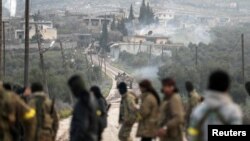The United States and European powers are vowing a "firm response" to those responsible for recent alleged toxic gas attacks in Syria's eastern Ghouta, where hundreds of civilians have died in recent weeks.
Their warning came as the United Nations' human rights chief said Friday that the slaughter of civilians in Ghouta and elsewhere were "likely war crimes and potentially crimes against humanity."
In a telephone conversation Friday, U.S. President Donald Trump and German Chancellor Angela Merkel agreed that the government of Syrian President Bashar al-Assad "must be held accountable," a German chancellery statement said.
"This applies both to the Assad regime's deployment of chemical weapons and for its attacks against civilians and the blockade of humanitarian support," the statement said.
In a separate conversation, Trump and French President Emmanuel Macron vowed there would be "no impunity" for those responsible if further chemical weapons attacks occurred, the French president's office said.
Macron "stressed there will be a firm response in the case of proven use of chemical weapons leading to the death of civilians, in close coordination with our American allies," the office said.
"France and the United States will not tolerate impunity," it said.
Independent observers and residents have reported several alleged chlorine gas attacks in eastern Ghouta in the last month, including one in which a child allegedly suffocated to death last weekend.
Airfield bombed
Trump ordered a massive bombardment of Syria's Shayrat airfield last April after reports of a sarin nerve gas attack in the town of Khan Sheikhun that killed nearly 100 civilians. He said at that time that any further use of such banned weapons of mass destruction would prompt a similar response.
Washington this week asked the U.N. Security Council to set up a new inquiry into who is responsible for chemical weapons attacks in Syria after reports of the suspected chlorine use in eastern Ghouta.
A previous chemical weapons inquiry in Syria died in November when Russia refused to go along with a Western bid to renew its mandate.
U.N. human rights chief Zeid Ra'ad Al Hussein issued a warning Friday about the re-emergence of chemical attacks in Ghouta as well as the fierce Syrian government bombing campaign that he said had targeted civilian areas and hospitals and killed more than 600 people since last month.
"What we are seeing in eastern Ghouta and elsewhere in Syria are likely war crimes and potentially crimes against humanity," Zeid told a meeting of the U.N. Human Rights Council in Geneva.
"Civilians are being pounded into submission or death," he said, warning that the perpetrators will not "get away with this."
"The wheels of justice may be slow, but they do grind," Zeid said.
Western nations that sit on the rights body drafted a resolution that condemns the government attacks and demands the immediate start of a monthlong truce across Syria that the U.N. Security Council has been seeking.
But action on the measure was put off amid disagreement from Russia and other countries about the wording, officials said.
Moscow and Damascus both denied that Syria is using chemical weapons or targeting civilians and hospitals in Ghouta.
Some material for this article came from AP, AFP, dpa, Interfax and Reuters.




